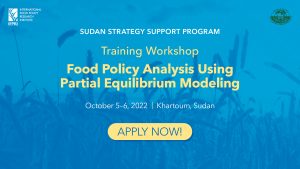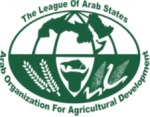October 5th – 6th, 2022
Khartoum, Sudan

Invitation and Call for Application
Partial equilibrium models can provide important insights for food policy in the context of shocks to production, household incomes and international prices. Combining estimates of current levels of supply, demand by various household groups and key model parameters describing the responsiveness of supply and demand to changes in prices and incomes, these models help to quantify effects of economic shocks and alternative policy options.
This hands-on workshop will include a presentation of a partial equilibrium model of Sudan’s wheat economy based on the model used in a recent analysis of the estimated effects of changes in the bread subsidy in Sudan in later 2021 and early 2022 (Distributional consequences of wheat policy in Sudan). Participants will use a set of partial equilibrium models that capture key features of Sudan’s wheat economy. The versions of the models used in this course are written in Microsoft Excel workbooks and are solved using an Excel equation solver.
This two-day training event to be held at the Arab Organization for Agricultural Development (AOAD) in Khartoum (Amarat street 7) will be led by Drs. Paul Dorosh and Khalid Siddig of the International Food Policy Research Institute (IFPRI).
Interested participants with economics, agricultural economics, development economics, or related backgrounds with a solid understanding of economics are welcome to apply.
Apply HERE
Please send the following supporting documents to ifpri-sudan@cgiar.org
- A one-pager Curriculum Vitae,
- A letter of interest and
- A copy of their most recent academic diploma/certificate.
Short-listed participants will be contacted at the end of September with information on further steps and will be provided reading materials, the workshop program, and guidelines for course preparation.
